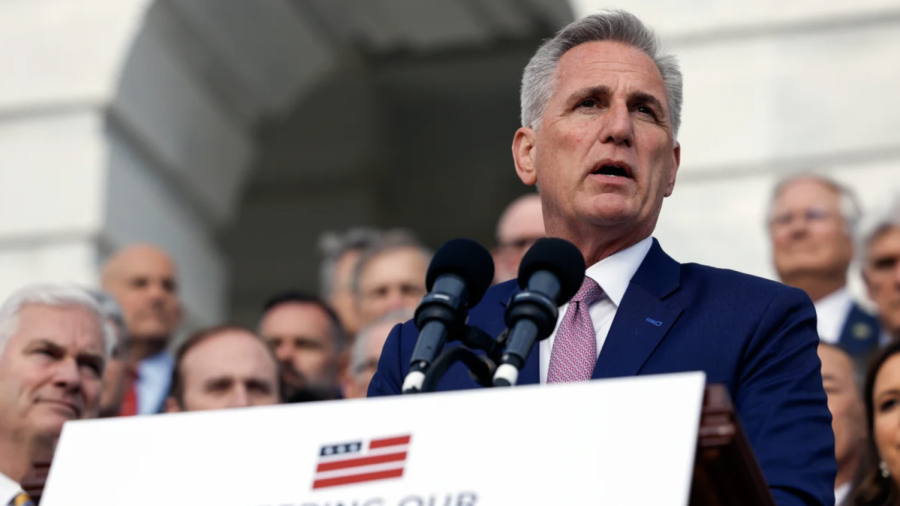GOP leaders reverse course and change debt limit plan in push to pass bill on Wednesday
House Speaker Kevin McCarthy speaks at an event celebrating 100 days of House Republican rule at the Capitol Building April 17 in Washington, DC. (Anna Moneymaker/Getty Images)
CNN– House Speaker Kevin McCarthy and his top allies have reversed course and changed their bill for raising the nation’s borrowing limit – and agreed to make two major changes overnight in a bid to pass the package Wednesday in their standoff with the White House.
It’s not clear if even those changes will yield enough support to pass the bill, as McCarthy can only lose four votes in the narrowly divided House. Yet, after days of proclaiming that the bill was final and that no changes would be made, leadership caved realizing that without some of these tweaks, the bill didn’t have a chance of passing.
Passing the measure is mainly aimed at boosting McCarthy’s negotiating stance with Democrats, as both the White House has issued a veto threat for the legislation and Senate Majority Leader Chuck Schumer on Tuesday described the bill as dead on arrival. Still, if McCarthy can unite his conference and force a bill through the chamber, it would be a symbolic win for GOP leadership, as the country approaches its default deadline as soon as this summer.
Republicans agreed to allow proposed work requirements for Medicaid beneficiaries to be implemented on a quicker timetable – a move intended to win over GOP Rep. Matt Gaetz of Florida and others who had warned they would vote against the bill without such changes.
Also, top Republicans agreed to remove a repeal of certain tax breaks for biofuels like ethanol — an issue that prompted furious opposition from the four Iowa Republicans and some other midwestern lawmakers.
Even after those changes, McCarthy still faced opposition from members who oppose raise the nation’s borrowing limit in general.
Still no,” GOP Rep. Tim Burchett of Tennessee, who has long opposed raising the debt ceiling, said as he entered House Republicans’ conference meeting Wednesday.
Another GOP holdout, Gaetz, said he is still reviewing the changes, but said that he was not happy about last-minute tweaks made in the middle of the night, despite the fact they were made in part to appease him.
“Last-minute changes are no way to run a railroad,” he told reporters.
However, members of the Iowa congressional delegation signaled support for the bill after their leadership made 11th-hour changes to the biofuel tax credits. Republican Rep. Zach Nunn said the changes were “huge” and marked a major sea change from where they’d been 24 hours prior when they’d insisted on not changing the bill.
After recessing the House Rules Committee before midnight Tuesday night, leaders scrambled behind the scenes to find a way to convince two different groups of holdouts to back their legislation. When rules came back in the early Wednesday morning hours, they had series of changes that they hope will get them the votes they need.
The House could now vote as soon as Wednesday to try to pass the legislation, though GOP leaders could also delay the vote beyond Wednesday if they need additional time to wrangle members.
A Republican leadership aide sounded hopeful to CNN early on Wednesday morning: although there is more checking to do, things are “moving in the right direction.”
Republicans huddled on Wednesday morning for their conference meeting, with McCarthy pitching his members on plan and framing last-minute changes as “technical changes,” according to a source in the room, in an attempt to downplay their reversal after insisting they would’t open the bill back up. Some members are upset that leadership made changes in the middle of the night to appease a small faction of holdouts.
The package raises the nation’s $31.4 trillion debt limit by an additional $1.5 trillion. But the plan also states that if the new debt limit is not breached by March 31, 2024, then Congress must again increase the borrowing authority by that date, proposing to reignite a major fiscal battle in the middle of a presidential election year.
In their “Limit, Save, Grow Act,” House Republicans propose sizable cuts to domestic programs and intend to spare the Pentagon’s budget, returning funding for federal agencies to 2022 levels while aiming to limit the growth in spending to 1% per year. The nonpartisan Congressional Budget Office said that the bill would trim government deficits by $4.8 trillion over 10 years.
As part of the 320-page bill, the GOP also proposes to block President Joe Biden’s plan to grant student loan forgiveness, repeal green energy tax credits and kill new Internal Revenue Service funding enacted as part of the Inflation Reduction Act. The measure would also impose new proposals to give Congress more power to halt regulations from the executive branch. The plan would also expedite new oil drilling projects while rescinding funding enacted to respond to the Covid-19 pandemic.
Wrangling the diverse conference to coalesce around the bill is the biggest test yet for McCarthy, who just hit 100 days in the role after a tumultuous journey to capture the gavel.
But clearing the hurdle of gaining the support from his own conference only gets him to the starting line in negotiations with the White House, who has already made it clear they want the debt ceiling raised without conditions.
McCarthy has not yet suffered a defeat on the floor, but Republican leadership has been strategic to only put up bills that can clear the chamber. Compounding the issues for McCarthy is that he only has until Friday before the House leaves for a week long recess, putting default closer if they are not able to come to a resolution on this bill.
This story has been updated to include additional developments.



